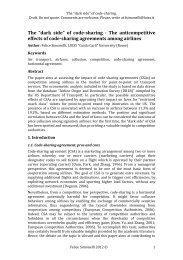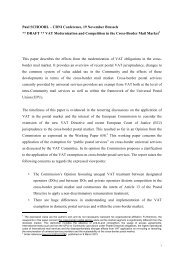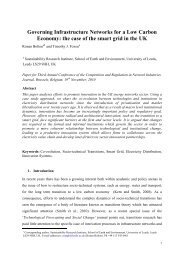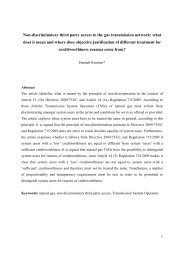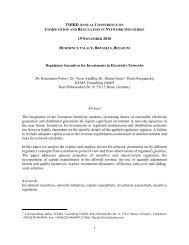The legal framework of services of general economic interest in the ...
The legal framework of services of general economic interest in the ...
The legal framework of services of general economic interest in the ...
You also want an ePaper? Increase the reach of your titles
YUMPU automatically turns print PDFs into web optimized ePapers that Google loves.
This paper is aimed to identify <strong>the</strong> European <strong>legal</strong> <strong>framework</strong> <strong>of</strong> <strong>services</strong> <strong>of</strong> <strong>general</strong><br />
<strong>economic</strong> <strong><strong>in</strong>terest</strong>. It also seeks to determ<strong>in</strong>e whe<strong>the</strong>r and to what extent European law has<br />
contributed to <strong>the</strong>ir liberalization and to privatization <strong>of</strong> <strong>the</strong>ir providers.<br />
Firstly, it analyzes <strong>the</strong> impact <strong>of</strong> European law on privatization <strong>of</strong> public undertak<strong>in</strong>gs.<br />
Secondly, it <strong>of</strong>fers a def<strong>in</strong>ition, which is not provided by European law, <strong>of</strong> <strong>services</strong> <strong>of</strong><br />
<strong>general</strong> <strong>economic</strong> <strong><strong>in</strong>terest</strong>.<br />
Thirdly, it exam<strong>in</strong>es <strong>the</strong> impact <strong>of</strong> European law on liberalization <strong>of</strong> <strong>the</strong>se <strong>services</strong>.<br />
F<strong>in</strong>ally, it evaluates <strong>the</strong> relationship between liberalization <strong>of</strong> <strong>services</strong> <strong>of</strong> <strong>general</strong> <strong>economic</strong><br />
<strong><strong>in</strong>terest</strong> and privatization <strong>of</strong> <strong>the</strong>ir supplier. This would lead to understand whe<strong>the</strong>r, under <strong>the</strong><br />
supervision <strong>of</strong> <strong>the</strong> European <strong>in</strong>stitutions, <strong>the</strong>re is a substantial change <strong>of</strong> <strong>the</strong> role <strong>of</strong> Member States<br />
from <strong>the</strong> suppliers <strong>of</strong> <strong>the</strong> <strong>services</strong> to <strong>the</strong> regulators <strong>of</strong> <strong>the</strong> market forces that guarantee <strong>the</strong>m.<br />
2. Impact <strong>of</strong> European law on privatization <strong>of</strong> public undertak<strong>in</strong>gs<br />
European law does not <strong>of</strong>fer an accurate <strong>legal</strong> <strong>framework</strong> for <strong>the</strong> alienation <strong>of</strong> public<br />
enterprises, consecrated by an explicit norm 1 . In fact, art. 345 TFEU provides that <strong>the</strong> “Treaty shall<br />
<strong>in</strong> no way prejudice <strong>the</strong> rules <strong>in</strong> Member States govern<strong>in</strong>g <strong>the</strong> system <strong>of</strong> property ownership” 2 .<br />
Member States may take over, control and sale a company under <strong>the</strong> same conditions as private<br />
operators, with <strong>the</strong> exclusive limitation <strong>of</strong> not violat<strong>in</strong>g <strong>the</strong> law which may be applicable <strong>in</strong> specific<br />
circumstances 3 . <strong>The</strong> absence <strong>of</strong> a regulation or a directive <strong>in</strong> this context leads to not be ruled out, at<br />
present, a turnaround, s<strong>in</strong>ce domestic provisions have rema<strong>in</strong>ed unchanged.<br />
<strong>The</strong>refore, privatization does not represent a pr<strong>in</strong>ciple firmly acquired <strong>in</strong> European law.<br />
<strong>The</strong>y do not f<strong>in</strong>d <strong>the</strong>ir immediate genesis <strong>in</strong> <strong>the</strong> aspiration to implement <strong>in</strong> a concrete manner <strong>the</strong><br />
precept enshr<strong>in</strong>ed <strong>in</strong> <strong>the</strong> Treaty <strong>of</strong> <strong>the</strong> European market economy by remov<strong>in</strong>g <strong>the</strong> differences<br />
between public and private enterprises. <strong>The</strong>y result from particular situations related to <strong>in</strong>dividual<br />
domestic contexts. <strong>The</strong> existence <strong>of</strong> rules related to <strong>the</strong> specific needs <strong>of</strong> reduction <strong>of</strong> <strong>the</strong> space<br />
reserved for public <strong>in</strong>tervention <strong>in</strong> <strong>the</strong> economy can be considered merely an external factor.<br />
<strong>The</strong> impossibility to identify a standard development <strong>of</strong> <strong>the</strong> privatization processes is due<br />
precisely to <strong>the</strong> <strong>in</strong>herent limitations <strong>of</strong> unify<strong>in</strong>g power <strong>of</strong> European law and, as a result, from <strong>the</strong><br />
absence <strong>of</strong> its uniform impact on <strong>the</strong>m. Never<strong>the</strong>less, <strong>the</strong> lack <strong>of</strong> an express provision requir<strong>in</strong>g<br />
<strong>the</strong>m is not <strong>in</strong> contrast with <strong>the</strong> orientation that European law favours <strong>the</strong>m. It conta<strong>in</strong>s some<br />
pr<strong>in</strong>ciples which, by disregard<strong>in</strong>g <strong>the</strong> conditions <strong>of</strong> existence or ma<strong>in</strong>tenance <strong>of</strong> State-owned<br />
enterprises, <strong>in</strong>directly promote <strong>the</strong>m. This position is based on a fundamental argument that can be<br />
expla<strong>in</strong>ed <strong>in</strong> <strong>the</strong> form <strong>of</strong> a syllogism.<br />
Firstly, pursuant to art. 106, para. 1 TFEU: «In <strong>the</strong> case <strong>of</strong> public undertak<strong>in</strong>gs and<br />
undertak<strong>in</strong>gs to which Member States grant special or exclusive rights, Member States shall nei<strong>the</strong>r<br />
enact nor ma<strong>in</strong>ta<strong>in</strong> <strong>in</strong> force any measure contrary to <strong>the</strong> rules conta<strong>in</strong>ed <strong>in</strong> <strong>the</strong> Treaties,…». <strong>The</strong><br />
1 EHLERMANN, C.D. (1992) “<strong>The</strong> Contribution <strong>of</strong> EC Competition Policy to <strong>the</strong> S<strong>in</strong>gle Market”, Common Market Law<br />
Review, 29: 257-282.<br />
2 AKKERMANS, B. AND RAMAEKERS, E. (2010) “Article 345 TFEU (ex Article 295 EC), Its Mean<strong>in</strong>gs and<br />
Interpretations”, European Law Journal, 16: 292-314.<br />
3 DEVROE, W. (1997) “Privatizations and Community Law: Neutrality versus Policy”, Common Market Law Review, 34:<br />
267-306; VERHOEVEN, A. (1996) “Privatisation and EC Law: Is <strong>the</strong> European Commission “Neutral” with Respect to<br />
Public versus Private Ownership <strong>of</strong> Companies”, International Comparative Law Quarterly, 45: 861-887.<br />
2



